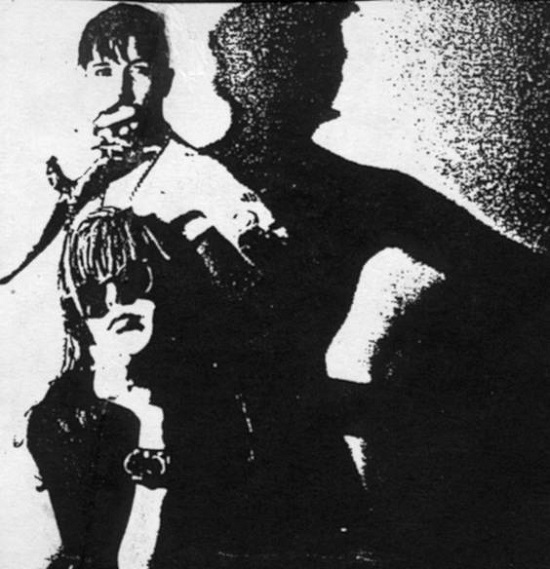The young reporter from MuchMusic is faux-freaked out, explaining to the television audience that she’s been warned the band she’s about to interview are scary feminists, "So are you feminists?" she asks Fifth Column, wide-eyed and ridiculous. "Bull dykes from Transylvania" comes the prompt response. And they’re gonna eat your babies too. Terrorist-drag performance artist Vaginal Davis describes the band as "sirens sent to destroy your ship", and as she is no slouch when it comes to that kind of behaviour it’s clear that Fifth Column were a force to be reckoned with.
She Said Boom: The Story Of Fifth Column recently showed at the London Lesbian and Gay Film Festival. Directed by fellow Toronto dweller and friend/fan Kevin Hegge, the documentary is comprised of contemporary interviews and archival footage, as well as the super 8 films so important to the band. It is a long overdue insight into the development of queercore and the impact of Fifth Column, who are widely credited as progenitors of the scene.
Living up to their name, (a "fifth column" is a group who subverts from within) they aimed to fuck both the straight punk scene and the gay mainstream inside out, meeting in the cockroach infested living rooms of bleak Toronto neighbourhoods in the mid-80s to produce art and music that would challenge and resist, creating space for queer, anti-capitalist punks to come charging through the status quo.
Fittingly, the LLGFF screening opened with the 1992 film The YoYo Gang, one of many super 8s directed by G.B. Jones, a founding member of Fifth Column. This film, featuring influential queer musicians such as Donna Dresch (Team Dresch, Chainsaw) and Leslie Mah (Tribe 8, Anti-Scrunti Faction), follows the exploits of the YoYo Gang and the Skateboard Gang, tough dyke punks (who yoyo and skateboard), with an appearance by underground queer porn director Bruce LaBruce in his early incarnation as the Fifth Column gogo dancer. The overdubbed campy dialogue and bratty attitude, combined with queer sex and a punk soundtrack encapsulates the essence of this DIY movement which sought to challenge the homophobia in punk while rejecting the conformity and gender binaries of the gay and lesbian scene. Aesthetically their world resembled the sewn-together monster of John Waters and The Rocky Horror Picture Show, with music, zines and Super 8 film their tools of dissemination.
She Said Boom offers intriguing insights for the queercore fan and newcomers alike, doing as much to dispel romantic nostalgia for "back then" as to re-ignite the excitement and passion generated by the refusal to conform. Discussing their seminal zine J.D.s which they began publishing in 1985, G.B. Jones and Bruce LaBruce reveal that despite the zine’s role in spreading the word about the burgeoning homocore/queercore scene in Toronto – the photocopied pages offering the city up as a virtual mecca for queer punks – this was less actual reality and more their fantastical dream played out in subverted homoerotic images of straight boys at punk shows (and as Bruce LaBruce admits, sometimes those images were obtained by inviting straight boy punks home, getting them drunk and making them take their clothes off).
But whatever the "reality" of the scene, simply the notion that there was a community of queer punks out there meant that things snowballed; it’s not that queer punk didn’t exist until this point, even a brief look at Vaginal Davis’ 30 year legacy puts paid to that idea, but the fuse was just waiting to be lit. Bands were formed such as God is My Co-Pilot, Pansy Division, Tribe 8 and Sister George and record labels like Outpunk and Chainsaw began releasing specifically queer punk.
Cynics may roll their eyes at the ubiquitous Kathleen Hanna showing up in the documentary, I am not one of these cynics however, and her inclusion serves to put Fifth Column into context. The band are hardly a household name despite their influence, and Kathleen Hanna is (as always) quick to give credit where it’s due and strikes to the heart of the issue, emphasising that queercore bands were a massive influence for her, and when she saw Fifth Column play in the early 90s she wondered why Bikini Kill were so much more famous, as Fifth Column were a much "better band". She goes on to surmise it was due to the fact that Bikini Kill were perceived as straight, and the outspoken queerness of Fifth Column meant they were not given the recognition they were due.
Other opinions on this matter come from past members of the band, and it was made clear that G.B. Jones and singer Caroline Azar had a stronghold on the direction of Fifth Column, with G.B. ensuring that the band didn’t sell out. Former members admitted they would’ve liked to take the band further, but that G.B. "wouldn’t allow that". Indeed, during the Q&A following the film Director Kevin Hegge revealed that those involved with the band, including Bruce LaBruce, were estranged from each other, and haven’t talked in years. Refreshingly however, despite the fact that there were obviously massive fallings out, the documentary never descends into a shit-slinging contest (unlike say, the 1995 Slampt documentary Slamptumentary which disappointingly dwelt on interpersonal problems and everyone just looked really whiny). The documentary instead hilariously plays up the "where are they now" angle with the context in which the former bandmates are interviewed. Mysterious, legendary, sunglasses-at-night G.B. Jones is interviewed in a graveyard, while perky Caroline Azar wears a bright silk scarf and has a candy-coloured plastic ice cream in the background. Guitarist Charlotte Briede is filmed in her wetsuit at the beach and Bruce LaBruce is in a strip club wearing a t-shirt promoting his film L.A. Zombie ("he came to fuck the dead back to life"), a mostly naked boy posing in the mirrored walls behind him. Clearly, they have gone their separate ways.

Throughout the documentary the music of Fifth Column provides the soundtrack, a combination of melancholic, experimental post-punk tinged with psychedelia, such as the dark and cinematic ’Like This’, and ‘Fairview Mall Story’ a queercore classic which deals with the publishing of the names of men arrested by police for having sex at Fairview Mall by the media, and more traditional aggressive punk such as the infamous track ‘All Women Are Bitches’ which got them banned from MuchMusic. A bandmate mentions that G.B. Jones once made a mix tape for friends which she named The Sound of Music Falling Apart which described the music of Fifth Column rather well; as with everything, they deconstructed music and produced something unexpected.
It struck me, listening to the band talk about their unconventional approach to making music, that this legacy of experimentation in the queer music scene is still underrated. It’s common for current UK queer DIY bands to be lazily described in the press as "riot grrrl" presumably due to the presence of girls in the band and a lo-fi intent. Bands such as Woolf, Roseanne Barrr, Corey Orbison and the like barely have a passing reference to, say, Bikini Kill or Skinned Teen and yet all have had the moniker of "riot grrrl" attached at some point, while the boundary pushing, experimental sounds they are investigating in their music are rarely mentioned. But these bands, along with Faggot, Homosexual Death Drive, Methodist Centre, Humousexual and a host of others all have a legacy in queercore, which as a movement expanded beyond conventional guitar-based music while retaining the commitment to DIY punk and a rejection of the norm.
Kevin Hegge said that he decided to make She Said Boom one day when he was listening to Fifth Column album 36-C, and he got to wondering why it hadn’t been done before. Indeed this seems to be a common theme; people love Fifth Column but know nothing about them. In a way, it’s important not to get too caught up in the details of the past as there is always the danger of rarefication and obsessive detail-hunting at the expense of creation, however this is an important documentary, a reminder of the longevity of queer cultural movements and a long-awaited insight and celebration of the band, Fifth Column.


